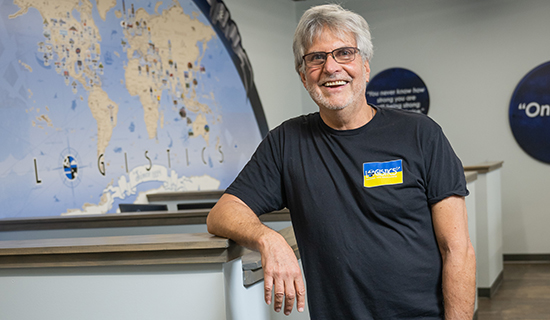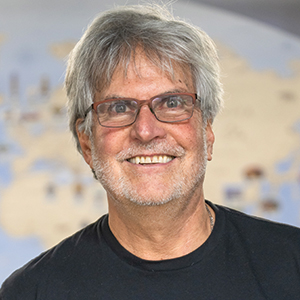Once Jim Berlin told the lie, he became determined to make it the truth. And with the founding of Logistics Plus Inc. — the transportation, logistics and supply chain solutions company he owns — Berlin turned that truth into a triumph.
In 1996, Berlin, freshly fired by a trucking company, was asked by an interviewer for a potential job if he owned his own business. Surprising himself, he blurted out, “Yes.”
To that point, Berlin’s only business experience had been at the trucking company that fired him, running a company store that sold hats and shirts with its logo. But in that moment, at the job interview, when he replied yes, he didn’t realize how prepared he actually was for the new adventure he was unexpectedly embarking upon.
Hours later, he was a business owner. Berlin drove from the interview in Jamestown, New York, and made a pit stop at the county clerk’s office, where he registered a company in his name called Logistics Plus.
“I’m lucky that I lived in a country and in a state where, on a whim, you can start a company,” he says today.
With that stop, Berlin was no longer a trucking terminal manager. He was a business owner. And although the start to that career and the way he has since approached growing his business are unconventional, the results speak for themselves. Today, Logistics Plus is a global provider of transportation, warehousing, fulfillment, global logistics, business intelligence, technology and supply chain solutions, with more than 1,000 employees in more than 30 countries. It does nearly half a billion dollars in annual revenue.
The secret to his success lies within Berlin, an exuberant owner and CEO who claims he has “more guts than brains,” who uses sports analogies to explain his leadership style and who admits that his story is hard to fathom.
“It’s very unbelievable,” he says, “but it’s all true.”
Along the way, he has learned several lessons about how to lead your own way and turn an idea into a resounding business success.
Changing lanes
Berlin would not have been looking for a job in 1996 if not for his own self-described “big mouth.” He says he mouthed off to the wrong person, but he did so in defense of a customer.
The trucking company for which Berlin — a former truck driver — worked as a terminal manager had botched a next-day delivery that he had arranged for an important order. He complained — “over-exuberantly,” he says — to the terminal manager at the origin site, leading to a sequence of events that resulted in his termination.
“I had to face my wife and kids, out of a job at 45 years old,” Berlin says. “But I went to bat for my customer, so I could live with myself.”
He eventually was offered a job by another trucking company, but the conversation with the interviewer at the client company he had stood up for — the one in which he lied about having his own business — motivated him to form his new company, one where he could put the customer first. With a $120,000 purchase order to manage that company’s inbound domestic transportation, Logistics Plus was launched.
Berlin’s intimate knowledge of the former customer’s operation from his time as a trucker and terminal manager gave him actionable insight. He knew, for instance, that one of its production facility in Grove City, Pennsylvania, had four or five trucks rushing order shipments on Fridays. He knew that, with better planning, he could consolidate those orders onto a single truck, saving the company money.
“But we were outsiders, and a lot of folks didn’t want us there in their soup,” Berlin says. “That week, they didn’t order a thing on Friday, so they ended up paying for a truck and a driver to sit all day and do nothing.”
It was a dirty trick meant to send a message to Berlin, and he admitted temporary defeat. But he knew there was no way they could go two weeks without placing orders, so he arranged his truck once again the following week, and this time his expedited process played out perfectly.
Berlin won a corporate best practice honor from the company for that idea, and within a short time, as it began to globalize, it used Logistics Plus in its expansion efforts.
Suddenly, the company that Berlin created on a whim in a county clerk’s office was operating in Mexico, Asia, India and Europe. Not bad for a guy with no formal business training.
“I tell people I went to the Thomas School of Business,” Berlin says. “Thurman Thomas [the Hall of Fame running back for the Buffalo Bills]. I stayed down behind the big guys and followed their lead.”
Man without a plan
Berlin also knows how to follow his gut. In 2003, with Logistics Plus in need of a larger company headquarters because of its growth, he toured Erie’s historic Union Station building and, despite appearances, felt it was the perfect fit.
“It was an old building in bad shape, and it’s still an old building in bad shape,” he says. “But it’s a cool building. And it felt like a way to improve the community [by bringing it back to life].”
At a meeting with a variety of banks, looking for a mortgage loan for the property, Berlin was asked for a business plan. He didn’t have one.
“I had one chart I had made up that showed our profit growth,” he says. “That’s all I had. I basically pulled that out and said, ‘Our business plan is to keep doing this.’”
Surprisingly, it worked. Berlin found a bank that believed in him and was willing to extend the loan, which he has since paid off.
“Business plans are not worth the paper they’re written on,” he says. “I think that’s a major lesson that people have to learn. Who had COVID-19 in their business plan? Like Mike Tyson says, ‘Everyone has a plan until they get punched in the mouth.’”
That’s the feeling Berlin had about 10 years ago, when his first customer brought in consultants who recommended, among other things, that Logistics Plus’ role in the organization be reduced. It was a huge blow because, from that initial purchase order through the first 15 years of Logistics Plus’ existence, it had been the company’s largest customer.
But Berlin got some good advice at the time from an executive there who sensed that the company might come to regret the change and advised — with yet another sports analogy — that Berlin not to burn bridges by moaning about the move.
“If I were you, I’d hang around the rim,” Berlin remembers the exec saying, “because the ball might bounce your way.”
Sure enough, it did. And all these years later, that initial customer — the one whose interviewer Berlin told he owned his own business — remains Logistic Plus’ No. 1 customer.
Keep on truckin’
So much of Logistics Plus’ success comes down to the culture Berlin has created. Much like his own path to company ownership, his leadership style eschews corporate convention. He considers himself a product of the counterculture ’60s and places value on individuality.
“We were Google before Google,” he says. “We’ve always had a loose structure.”
From his trucking career, he remembers the experience of enduring review systems in which he was rated on a five-point scale, with a perfect 5 was an impossibility.
“One time my boss was giving me a review, and we were the best operating terminal by far,” he says. “But he wasn’t allowed to give me all 5s. He had to find some 3s or 4s. I never liked the formulaic way.”
Berlin has created a work environment in which meetings are rare and multitasking and personal communication are valued.
And while Logistics Plus has expanded — and has employees — around the world, it values the community in which it is based.
The purchase of the Union Station and, as part of recent expansion, the historic Skinner Engine building helped revitalize the downtown Erie area. An internship program has given dozens of local college students post-graduation career opportunities. The company makes regular donations and provides corporate sponsorships to a variety of local and regional charities, including arms of the March of Dimes, United Way, American Heart Association and others. And when Russia invaded Ukraine in early 2022, Logistics Plus donated more than half a million dollars to employees in Ukraine impacted by the war.
For those efforts, Logistics Plus was recently presented with the Outstanding Philanthropic Organization Award by the Northwestern Pennsylvania Chapter of the Association of Fundraising Professionals.
“It really is a people-first company,” Berlin says. “When you’re here, you can feel it. It’s not in a manual; it’s in the air.”
You don’t follow a manual launch to a company the way Berlin did. When he’s spoken to business students, he’s been careful to advise them, “Don’t try this at home.” But there are elements to the culture he’s created and the relationship-based way he operates that can apply to a lot of places.
“I’ve had CEOs of big companies visit us and pull me aside and say, ‘I wish our place had this kind of spirit,’” he says. “The only rule is the Golden Rule: Treat people the way you want to be treated. Everything else is details.” ●
TAKEAWAYS
- Treat people the way you want to be treated.
- Don’t burn bridges — the ball might bounce your way.
- Business plans aren’t worth the paper they’re written on; follow your gut.


